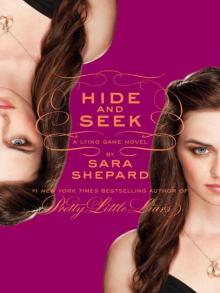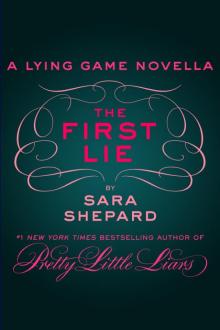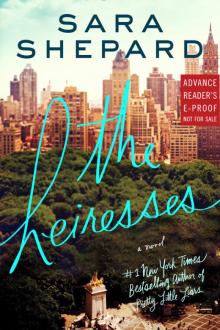- Home
- Shepard, Sara
The Heiresses Page 10
The Heiresses Read online
Page 10
“I always write down my dreams,” Danielle said in a matter-of-fact voice. “And then I analyze them for symbolism.”
As the summer wore on, Danielle introduced Aster to vodka, prank calling, and how to get a fake ID through the mail. They spent every night whispering secrets and dirty jokes and watching French films that made Aster blush. They snuck over to Finchy’s, the bar across the island, and claimed to be sisters, letting scruffy older guys hit on them and buy them shots of well whiskey that burned their throats. They stayed in touch all the next year, texting about boys they had kissed and parties they had gone to, and their grand plans to live on Bleecker Street together when they turned eighteen. When they both got into NYU later that year, they signed up to be roommates.
But then Saybrook’s needed a new face for its brand, and Aster seemed just the girl. Mason was enthusiastic about it, which was enough to persuade Aster—maybe this was her path. A week before she set off for Europe for the photo shoots, she was back at Meriweather with Danielle, on the beach outside the estate. Danielle took a sip of the vodka-lemonade Aster had mixed for them in her family’s kitchen. Then she said, “My mom told me the weirdest thing today. It made me think twice.”
“What was it?” Aster asked awkwardly. She always felt uncomfortable talking about Danielle’s parents. They fought constantly—Aster could hear them yelling from the estate—and this summer the fights had grown even more heated. Danielle was certain they were headed for divorce.
“Just weird stuff,” Danielle said, tracing a blue-painted toe through the sand.
“Come to Europe with me,” Aster blurted out. Why hadn’t she thought of this before? “I’ll be going to Paris, London, and Milan. I’ll pay for everything, just come. You could use some time away from here for a while.”
Danielle’s eyes were hard to read behind the Gucci shades Aster had bought for her. She twirled the diamond tennis bracelet Aster had given her as a birthday gift around her wrist. “I don’t know.”
“Come on,” Aster begged. “We can drink sangria by the bucket, hook up with European men, tan in Saint-Tropez . . .” she trailed off as something up the bluff caught her eye. Aster’s father was standing at the edge of the patio, gazing at them.
Aster half waved, thinking her father was looking for her. But Mason seemed to look right through her. Aster looked again and realized he wasn’t looking at her at all—he was staring at Danielle. She turned to her friend and realized that Danielle was wearing nothing but a skimpy string bikini. Danielle had untied the top strap while they were tanning, the fabric precariously clinging to her chest.
An oily feeling filled Aster. But by the time she looked up the bluff, Mason was gone.
Now Danielle cleared her throat. Aster shot up. The past didn’t matter; it was a long time ago. “Let’s get this over with,” she said flippantly, walking into the conference room and sitting down. “Do your thing.”
Danielle plopped the folder on the boardroom table, then looked at Aster as if she wanted to say something. Aster pointedly turned away.
After a beat of awkward silence, Danielle cleared her throat and launched into a speech about Saybrook’s employee policies. Then she dimmed the lights, and a movie came on the screen. Classical music played as the words “Saybrook’s: A Family Legacy” appeared. “I’d like to walk you through the rise of the late Alfred Saybrook,” Donald Sutherland’s voice intoned. “His father, Monroe, opened Saybrook & Browne’s Jewelers in Boston, Massachusetts, in 1922. It was a local establishment, mostly dealing in gold. Monroe never had plans to expand.”
Up popped a picture of the store that Aster’s great-grandfather opened near Beacon Hill. The 1920s storefront was modest, with old-fashioned script in the window and impossibly tiny diamonds in the display cases.
Aster glared at Danielle. “I already know all this.” Her grandfather used to tell this tale all the time.
Sorry, Danielle mouthed, but she didn’t stop the DVD.
“Monroe died from tuberculosis in 1938,” Sutherland went on. “Alfred was forced to take his place.” Next appeared a photo of Alfred in front of the store. A very young Edith—a teenager, probably—stood next to him, her arm looped through his elbow. Even though the photo was black and white, it was clear that she was a blonde, and that she was wearing dark lipstick. “But before long, World War II broke out, and Alfred bravely volunteered to fight.”
In the next photo—the same photo Mason kept in his study—Alfred was in a military uniform, standing with his friend Harold. “Edith kept the store running in the States as best she could, though times were tough—no one wanted to buy diamonds during the war. And then things changed. While Alfred was overseas, he found . . . this.”
A yellow stone appeared on the screen. Yeah, yeah, Aster thought. Not that she didn’t adore the giant, canary-yellow Corona Diamond, which her grandfather had found at a bazaar in Paris. But she’d practically come out of the womb knowing about it.
The video went on to discuss how the Corona Diamond elevated the company to a new stratosphere. Alfred opened a flagship store on Fifth Avenue while leasing office space down in TriBeCa to grow the business. Soon Saybrook’s Diamonds became the place to go for engagement rings, anniversary bands, and tennis bracelets. Celebrities flaunted their diamonds on the red carpet. Dignitaries bought jewels for their wives. There was a famous shot of Jackie Kennedy wearing a Saybrook’s pendant to a presidential ball, and a quote of her saying that Saybrook’s was the only place worth going for something precious.
“Alfred Saybrook’s death rocked the international jewelry community,” the voiceover said, showing a picture of Alfred shortly before his death five years before, wearing his trademark black suit and wingtips and little round glasses. “But now, the business is stronger than ever, and Saybrook’s stands by Alfred’s principles of integrity, quality, and craftsmanship.”
Then the screen went dark, and the lights came up. Danielle cleared her throat. “Um, I hope you found that informative.”
Aster stared at her. “Are you serious?”
“I’m sorry. It’s in my HR script.” Danielle ran her hand through her long red hair, her expression unreadable. “Look, I know you don’t want to be here, but it really is a good company to work for. And I’m sorry about Poppy,” she added.
Aster made a small noise at the back of her throat.
“And I heard about . . . you know.” Danielle’s eyes darted back and forth. “That it might be a murder. I’m usually at work early, but I had food poisoning that day. If only I’d been here, maybe I’d have seen something.” When Aster didn’t answer, she sighed. “I hope it didn’t have anything to with the issues at work . . .”
Aster cocked her head, wondering what Danielle meant. But she didn’t want to owe her anything, so she stood. “So where am I working again?”
Danielle glanced at Aster’s paperwork. “Private client group,” she said, directing her to the elevators. “It’s the by-appointment end of the business for high-net-worth clients looking for special, one-of-a-kind pieces. You’ll be working for Elizabeth Cole.” A strange look crossed Danielle’s face, but Aster decided not to ask about that, either.
Private Clients was one flight up and demarcated by transparent double doors. Inside, the music was a little louder, and there was a well-stocked bar cart and several crystal snifters in the corner. Nice, Aster thought, inspecting the spread. They had Hendrick’s gin and Delamain cognac and three types of infused vodka. Aster inched over and began to unscrew one of the lids. A little nip would definitely take the edge off what had already been a very crazy morning.
“Don’t even think about it.”
A woman with ash-blond hair, narrowed gray eyes, and a fitted gray suit marched toward Aster. There was something familiar about her, Aster thought. She’d probably met her at a Saybrook’s party. She’d met mo
st everyone in the Saybrook’s world at some point or another. “I think I’ll take this too.” She plucked the iPhone out of Aster’s hand.
“Hey!” Aster protested.
“No cell phones at work.” The woman started back to what must be her office. “I also don’t tolerate overly strong perfumes, leaving early for any reason, or outfits like that.” She glowered at Aster’s lace dress, fixating on its short hem.
Aster pulled her knees together. “It’s Valentino.”
The woman stared at her. “I’m Elizabeth Cole. As of today, you’re working for me, and I don’t care what your last name is.”
I knew this would happen, Aster thought. My boss hates me already.
Elizabeth marched into a large office decorated in white and gray, all clean lines and sharp angles. Three walls were lined with pictures of her posing with various high-profile clients—mostly stuffy businessmen Aster didn’t recognize, but Steven Tyler was in one, and Beyoncé in another. Dramatic floor-to-ceiling windows behind the desk looked out over the Hudson River, which was gray right now, under an overcast sky. It matched Aster’s mood perfectly.
Elizabeth slammed down a pile of papers, picked up a coffee flask, and thrust it into Aster’s face. “Skinny latte, no foam, and a gluten-free muffin from the bakery on the corner of Greenwich and Harrison.”
Aster stared at the mug. “You want me to get you coffee?”
Elizabeth’s gray eyes narrowed. “There are a lot of qualified girls who actually want this position. Not socialites with daddies who get them jobs. If you aren’t here to work, please see yourself out.”
A large part of Aster wanted nothing more than to go home and spend the rest of her life under her Frette duvet. But something kept her from moving. She was already here. She’d gotten up early, faced the painful memories of Poppy and the surprise appearance of Danielle Gilchrist, and she was still standing. She thought of Poppy, who had been so certain she would succeed. “You’re smart, Aster,” Poppy had said when she called Aster the day after Mason cut her off. “Smarter than you give yourself credit for. You can do great things, I just know it.” If she knew that Aster was thinking of quitting after just one hour, Poppy would’ve been disappointed.
“I’m staying,” Aster said firmly.
Elizabeth raised her eyebrows and offered a quick nod. “Fine.” Then she whipped around, shoved past Aster, and walked down the hall again. Halfway down, she swung back and stared at her. “Are you coming?”
Aster blinked in confusion, holding up the carafe. “What about your coffee?”
“After,” Elizabeth snapped.
She led Aster into a tiny cubicle with a low desk and a dusty computer. A tall, lanky guy with unkempt hair and Clark Kent–style glasses was typing something and squinting at the monitor. Aster wondered if she’d have to sit on his lap.
Elizabeth glowered at him. “You’re not done yet, Mitch?”
The guy scooted forward on the chair. “The server’s acting weird again.”
Elizabeth pressed her hand to her forehead, then looked at Aster. “Well, when he’s done, I want you to start on this.” She gestured to a large pile of papers on the edge of Aster’s desk.
Aster lifted the cover sheet and stared at a page. It was a list of names, addresses, phone numbers, and other pertinent information. “What is it?”
“Our client list. I’m going to need you to manually enter it into Excel.” She frowned at Aster’s blank stare. “You do know how to use Excel, right?”
“Of course she does,” the IT guy said quickly. Aster whipped around and stared at him. She’d never actually used Excel, but she knew better than to admit that now.
Elizabeth marched back into the hall. “Don’t go into my office when I’m not there. And don’t ever call me. IMs only, got it?”
Aster blinked. “Pardon?”
Elizabeth sighed. “Mitch, please explain to the heiress how a computer works.” Then she eyed Aster ominously. “Girls like you always get what’s coming to them in the end,” she added, before turning on her heel. Aster winced at the sound of her door slamming down the hall.
“Wow. She just went all evil Disney villainess on you.” Mitch, the IT guy, turned and faced Aster. He had brown eyes, blondish hair, and a cute bump on the end of his nose. Unlike everyone else at Saybrook’s, he wore Vans sneakers and no tie.
“Wait, I know you!” Aster cried. “I met you at last year’s Christmas party, didn’t I?” The company Christmas party was usually boring, but Aster remembered that last year she’d flirted with a cute geek. This cute geek.
“Good memory.” Mitch’s eyes lit up. “Welcome to the company. And”—he paused to cough into his fist—“I’m sorry about your cousin. She was well liked around here.”
“Did you know her?”
“A little.” Mitch shrugged. “She was nice to me. Some people brush off tech guys.” He cocked his head, shifted his gaze, and pointed dramatically at the door to Elizabeth’s office.
Aster riffled through the papers on the edge of her desk. The stack was thicker than a phone book. “Do I do this before I get her coffee, or after?”
“Definitely get the coffee first. That inputting will take days.” Mitch stepped closer. “Excel is a spreadsheet program, by the way. It’s not hard to figure out. I can help, if you want.”
“Thanks,” Aster said, trying to smile. But she felt tears at the corner of her eyes. She was so out of her element.
“Hey.” Mitch sidled closer. He smelled like laundry detergent and lemon. “You’ll be fine. Seriously, I can help with anything technical. I’m pretty good with this stuff,” he added shyly.
“I’ll keep that in mind.” Aster took a deep breath and turned toward the hall. “Okay, I’m off to get the coffee.”
“Good luck,” Mitch called out behind her, and Aster felt a little bit better.
Half an hour and a coffee spill later, Aster raced back into the Saybrook’s building and up to the ninth floor. There wasn’t a bakery at Greenwich and Harrison, but Aster had found one at Greenwich and King that seemed cute. Hopefully it was the one Elizabeth had meant.
She knocked on Elizabeth’s office door and, when no one answered, tentatively pushed it open. The office was empty. She quickly set the latte and muffin down on the desk and was turning to go when an image on Elizabeth’s bookshelf caught her eye. It was a framed photo of Elizabeth in a wedding dress—which seemed odd, since Aster could have sworn she hadn’t been wearing a ring earlier.
She stepped forward to examine the photo more closely. Elizabeth looked much younger, her skin smooth and her eyes unlined. Next to her was the groom, a tall man with slicked-back dark hair, an impish smile, and broad shoulders.
Aster’s blood turned to ice. She knew that man. It was Steven Barnett.
This was why Elizabeth seemed familiar. Aster had always known Steven was married, to someone named Betsy . . . which was, of course, a nickname for Elizabeth. Elizabeth—Betsy—had surely been at the end-of-year party five years ago too. Had she seen what happened between Aster and Steven?
“Ahem. What did I say about coming into my office when I’m not here?”
Elizabeth stood behind Aster in the doorway, glaring. Aster quickly took a step back. “Um, I’m sorry,” she mumbled, and turned awkwardly on her heel, but not before she saw Elizabeth’s eyes flit to the wedding photo.
As she raced down the hall, she swore she heard Elizabeth chuckle ever so softly behind her.
UNCORRECTED E-PROOF—NOT FOR SALE
HarperCollinsPublishers
....................................
10
A few days later, after work, Corinne sat on the Louis XIV settee in the living room of her Upper East Side apartment. The settee was a period piece with intricate carvings on the arms and legs and brand-new camel-hair upholstery,
but it wasn’t entirely comfortable. It came from Dixon’s great-grandmother, who had been French nobility and whom the family called grand-mère. Plenty of the other chairs and sofas in the large room were from the Saybrook side, along with a treasure trove of Tiffany lamps, botanical etchings, a Monet watercolor, and a vast collection of valuable porcelain and glass. Dixon wanted a picture of his family’s Texas ranch in the room too, but Corinne’s decorator, Yves, had insisted that the painting would ruin the room’s nineteenth-century ambience.
Evan Pierce sat opposite her, a large leather binder in her lap. “So we’ve got hydrangeas and peonies for the altar,” she repeated.
“That’s right,” Corinne answered, crossing her bare legs, which looked so pale and cellulite-y next to Evan’s smooth, whip-thin ones. “And I want to add lilies to the tables.”
“Poppy’s favorite.” Evan sighed, tucking a black lock behind her ear and marking it down in the book in her spiky handwriting. Even though Poppy and Evan’s friendship was one she had never quite understood, Corinne found comfort in knowing that Evan had been close to Poppy too.
Today, Evan wore a large platinum ring with a huge onyx stone. Corinne wondered who had given it to her. She wondered about Evan a lot, actually. She imagined her apartment as a movie set from the future, all white and hard lines. And what was it like to be so very single? Evan dated a lot, typically older men with a lot of money, but it was usually Evan who broke things off. And there was something about the way Evan moved, all slinky like a cat, that made Corinne think she was a ravenous lover. But maybe it was wrong to assume.
“And you’re choosing the wine tonight?” Evan said, still looking at her list. “The chef from Coxswain will meet you there.”
Corinne’s stomach lurched. Evan had arranged for a tasting at the St. Regis, where Will was friendly with the master sommelier.
“That’s the plan,” Corinne said shakily, then cleared her throat. “Actually, I’m wondering why you chose Coxswain.”

 The Lying Game #4: Hide and Seek
The Lying Game #4: Hide and Seek The Lying Game #5: Cross My Heart, Hope to Die
The Lying Game #5: Cross My Heart, Hope to Die 9780062240149 First Lie
9780062240149 First Lie Pretty Little Liars #13: Crushed
Pretty Little Liars #13: Crushed The Heiresses
The Heiresses